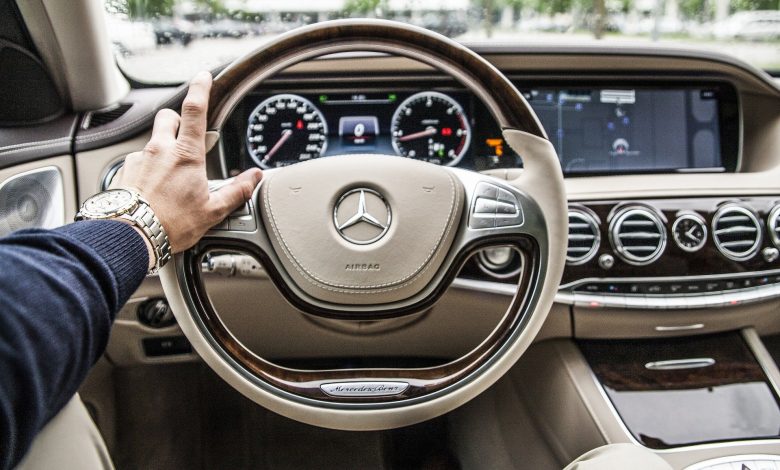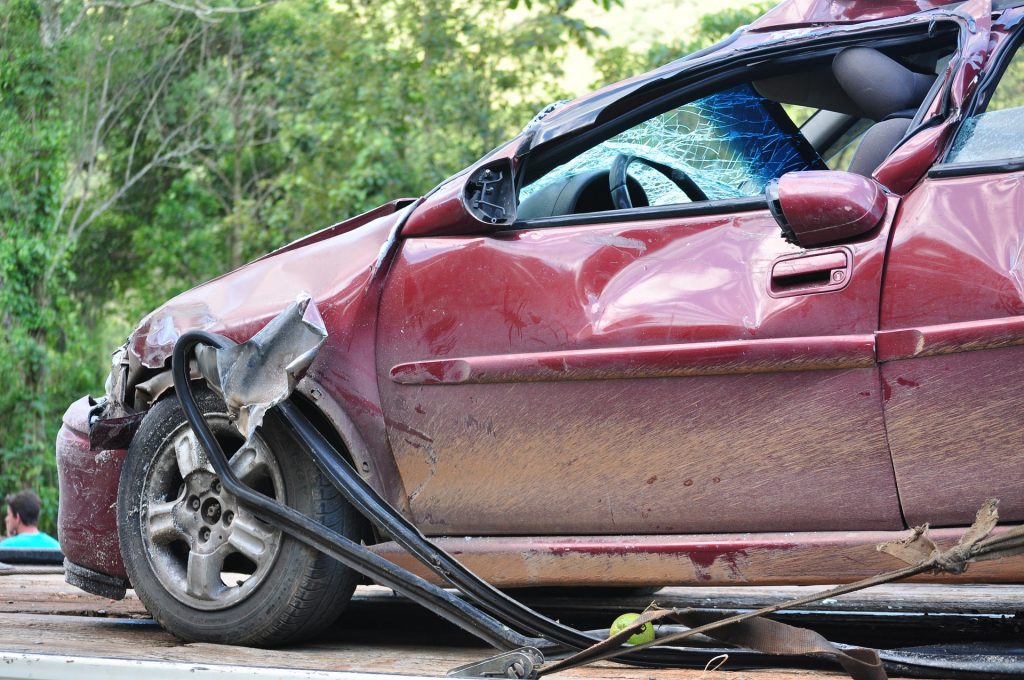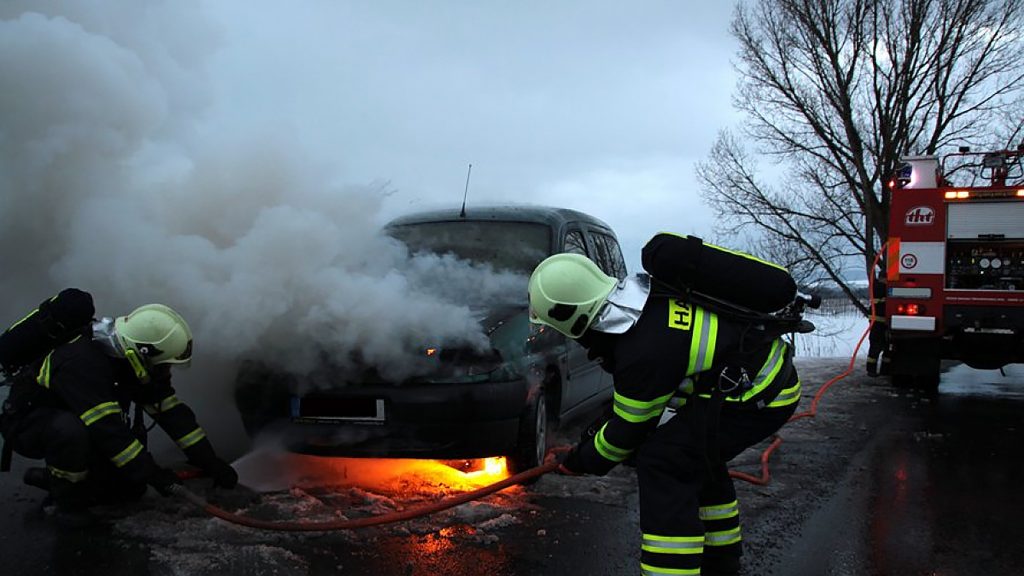What Is Vehicular Manslaughter?

Vehicular manslaughter is a serious crime that results when someone unintentionally causes the death of another person by breaking a traffic law. In rare instances, the perpetrator is not driving a vehicle, but most cases involve a distracted or intoxicated driver that causes an accident resulting in the death of passengers or pedestrians. Vehicular manslaughter can be either a misdemeanor or a felony, depending on the circumstances. Each state has its own laws governing vehicular manslaughter, and we will go over those below, in addition to examples of vehicular manslaughter and the resulting penalties.
Is Vehicular Manslaughter a Felony?
When vehicular manslaughter is the result of a minor infraction, such as speeding a few miles per hour over the limit, it could be viewed as a misdemeanor by the court. If someone commits vehicular manslaughter while driving under the influence of drugs or alcohol, however, the charge is more than likely to be a felony. In some states, like California, the penalty for vehicular manslaughter is dependent on whether or not the perpetrator acted with gross negligence or ordinary negligence.
What Is Ordinary Negligence?
Legally, negligence is failing to use reasonable care, resulting in damages to another person. The new term to define it now is “reasonable care,” which typically means what an average person would do in a comparable situation. Ordinary negligence normally refers to careless mistakes or not paying attention.
Examples of ordinary negligence include:
- Running through a red light or stop sign
- A driver going a few miles per hour over the speed limit
- Changing lanes and not seeing someone in your blind spot

What Is Gross Negligence?
Gross negligence is the willful disregard of the necessity to use reasonable care. While someone may think that looking at a cell phone would constitute a careless mistake, many states view this act as gross negligence as it willfully disregards laws against using a cell phone in a car.
Examples of gross negligence include:
- Texting while driving
- Driving while intoxicated
- A truck driver carrying too much weight in order to make more money
In some states, falling asleep at the wheel can constitute gross negligence. This is another grey area of the law that is handled differently on a state by state basis. Sleep does not come without warning. Therefore, if a driver is beginning to feel fatigued, that person is obligated to pull over to the side of the road. However, if someone suddenly has a blackout or a fainting spell, the sudden loss of consciousness would release the driver from being legally liable.

Distracted Driving Laws by State
There are 20 states that have outlawed using a handheld cellphone when driving. No state has banned all cell phone use for every driver, but 38 states have banned hands-free cellphone usage by teens or newly licensed drivers. There are 48 states that ban texting while driving, with Missouri and Montana being the two exceptions.
Alabama
One of the 30 states that allow handheld cellphone usage while driving is Alabama. But drivers aged 16 and 17 that have had their license for less than six months are banned from using all cellphones. While lax about handheld usage, Alabama does have a ban on texting while driving.
Alaska
Alaska allows the usage of handheld cellphones but bans texting while driving.
Arizona
Arizona bans handheld cellphones and bans all cellphone usage for bus drivers or drivers under 18 years old. Texting while driving is also illegal in Arizona.
Arkansas
The ban on handheld cellphones in Arkansas is limited to highway work zones, schools, and for drivers under 21 years old. Drivers under 18 and school bus drivers are not allowed to use any type of cellphone. Texting while driving is also banned in Arkansas.
California
Using a handheld cellphone and texting while driving is banned for all drivers in California. All cellphones are banned for bus drivers and drivers under 18 years old.
Colorado
There is no ban on using handheld cellphones, but there is on texting. Drivers under 18 years old are not allowed to use any type of cell phone.
Connecticut
All drivers are banned from texting while driving or using a handheld cellphone. Drivers under 18 and bus drivers are prohibited from using any cellphone.
Delaware
Texting while driving and using a handheld cellphone are both banned in Delaware.
District of Columbia
Using a handheld cellphone and texting while driving is prohibited in Washington, D.C.
Florida
There is no ban on cellphone usage in Florida, but texting while driving is illegal.
Georgia
All drivers are banned from using handheld cellphones and from texting while driving.
Hawaii
Hawaii bans handheld cellphone usage and texting while driving.
Idaho
You are not allowed to text while driving, but you can talk on a handheld in Idaho.
Illinois
All drivers are prohibited from talking on handheld cellphones and from texting while driving.
Indiana
Texting while driving is illegal in Indiana, but there is no ban on handheld usage. Drivers under 21 are not allowed to use a phone.
Iowa
There is no law against using a handheld phone while driving in Iowa, but texting while driving is illegal.
Kansas
There is no ban against handheld cellphone usage while driving, but there is a ban against texting.
Kentucky
You are not allowed to text while driving in Kentucky, but you are allowed to talk on a handheld.
Louisiana
There is no law against talking on a handheld cellphone while driving, but there is a law against texting.
Maine
Using a handheld cellphone or texting while driving is against the law in Maine.
Maryland
You are not allowed to talk on a handheld cellphone or text while driving in Maryland.
Massachusetts
Massachusetts is one of a few states that leaves handheld cellphone usage while driving up to the locality. All drivers in Massachusetts are banned from texting while driving.
Michigan
Another state that leaves its handheld laws up to local option is Michigan. Texting while driving in Michigan is against the law.
Minnesota
Talking on a handheld or texting while driving is against the law in Minnesota.
Mississippi
There is no law against talking on a handheld cellphone in Mississippi, but there is a law against texting while driving.
Missouri
In Missouri, drivers under 21 years old are prohibited from texting while driving, but older drivers are allowed to text. There is also no law against talking on a handheld cellphone while driving in Missouri.
Montana
There are no laws against texting while driving or talking on a handheld while driving in Montana.
Nebraska
It is not against the law to talk on a handheld while driving in Nebraska. But there is a law against texting while driving.
Nevada
You are not allowed to text or talk on a handheld cellphone while driving in Nevada.
New Hampshire
Texting while driving and talking on a handheld phone while driving is prohibited in New Hampshire.
New Jersey
All drivers are banned from texting and talking on a handheld cellphone while driving in New Jersey.
New Mexico
The local option is in place for New Mexico localities to decide whether or not someone is allowed to talk on a handheld while driving. Texting while driving is illegal in New Mexico.
New York
It is illegal for any driver to talk on a handheld or text while driving in New York.
North Carolina
All drivers are banned from talking on handhelds and texting while driving in North Carolina.
North Dakota
Drivers are allowed to talk on handheld cellphones while driving in North Carolina. But they are not allowed to text while driving.
Ohio
Ohio gives localities the option of choosing their handheld cellphone laws. All drivers are banned from texting while driving.
Oklahoma
Those with a learner’s permit, an intermediate license, and public transit drivers are banned from talking on handhelds while driving. All drivers are banned from texting while driving in Oklahoma.
Oregon
You are not allowed to text or talk on a handheld cellphone while driving in Oregon.
Pennsylvania
Pennsylvania is another state that provides a local option for determining laws on handheld usage while driving. All drivers are banned from texting.
Puerto Rico
All drivers are banned from talking on handheld cellphones and texting in Puerto Rico.
Rhode Island
All drivers are banned from texting or talking on a handheld cellphone while driving in Rhode Island.
South Carolina
There is no law against talking on a handheld cellphone while driving in South Carolina. But texting while driving is illegal.
South Dakota
Texting while driving is illegal in South Dakota, but talking on a handheld while driving is not.
Tennessee
You are not allowed to talk on a handheld cellphone or text while driving in Tennessee.
Texas
Only drivers in school crossing zones are banned from talking on handheld cellphones in Texas. But texting while driving is illegal.
Utah
In Utah, it is only an offense to talk on a handheld while driving if the driver is committing another moving violation—excluding speeding. All drivers are banned from texting.
Vermont
It is against the law to text or talk on a handheld cellphone while driving in Vermont.
Virginia
There is no law against talking on a handheld while driving in Virginia. But it is illegal for drivers to text.
Washington
It is illegal for all drivers to text or talk on a handheld cellphone in the state of Washington.
West Virginia
Just as in Washington, using a handheld or texting while driving is illegal in West Virginia.
Wisconsin
There is no law against drivers using a handheld cellphone in Wisconsin, but texting while driving is illegal.
Wyoming
You are allowed to use a handheld cellphone while driving in Wyoming. But you are not allowed to text.

Vehicular Manslaughter Laws by State
Below are examples of how states handle vehicular manslaughter laws differently, including two that do not have specific vehicular homicide laws.
Alabama
The first state we will highlight that does not have a vehicular homicide statute is Alabama. Depending on the circumstances on the road, a fatal car crash can result in three potential charges: murder, manslaughter, or negligent homicide.
Negligent Homicide
A driver could receive a charge of negligent homicide if they were driving in a criminally negligent manner. Alabama defines criminal negligence as unknowingly doing something that creates an unjustifiable and substantial risk to others on the road. The degree of the risk and the failure to recognize it must constitute a substantial deviation from the level of care that a reasonable driver would use on the road.
Manslaughter
A driver could receive a charge of manslaughter if they were driving recklessly. Alabama defines “recklessly” as knowingly taking action or failing to take action that results in a substantial and unjustifiable risk to others on the road. Like negligent homicide, the degree of the risk and the failure to recognize it must constitute a substantial deviation from the level of care that a reasonable driver would use on the road. The difference between manslaughter and negligent homicide in Alabama is whether or not the defendant was aware of the risk they created.
Second-Degree Murder
A driver commits second-degree murder if they recklessly engage in actions on the road that create a “grave risk of death” to another person under conditions that demonstrate “extreme indifference to human life.” The difference between second-degree murder and manslaughter is the degree of recklessness. The line between the two charges can be blurry, but typically, second-degree murder charges are the result of a defendant’s culpable mental state.
Penalty for Negligent Homicide
Negligent homicide in Alabama is a Class A misdemeanor that carries a maximum sentence of one year in jail and $6,000 in fines. However, negligent homicide that is committed when someone is driving under the influence (DUI) or boating under the influence (BUI) is a Class C felony. Those convicted of a Class C felony face a maximum sentence of ten years in jail and $15,000 in fines.
Penalty for Manslaughter
Manslaughter in Alabama is a Class B felony. The maximum sentence is 20 years in jail and $30,000 in fines.
Penalty for Second-Degree Murder
Second-degree murder in Alabama is a Class A felony that carries a maximum sentence of life in jail and $60,000 in fines.
California
In California, vehicular manslaughter law is dependent on whether someone acted with gross negligence or ordinary negligence when committing the crime. If someone acted with ordinary negligence, the penalty is a misdemeanor with a maximum sentence of one year in jail. If someone acts with gross negligence, the penalty becomes a wobbler.
So what is a wobbler? It means that the charge can be either a misdemeanor or a felony. If the charge is a misdemeanor, it comes with one year in county jail. But if the charge is a felony, a person will be facing up to six years in state prison.
Michigan
Unlike the majority of states, Michigan does not have any law governing vehicular homicide. Instead, if a driver causes the death of another person when behind the wheel, that person can be prosecuted under the state’s homicide laws. Depending on the details of the situation, a fatal accident can result in second-degree murder charges or manslaughter. Michigan law also has enhanced penalties if the accident was the result of reckless driver or OWI (operating while intoxicated).
Here’s how Michigan defines these laws:
Second-Degree Murder
To receive a charge of second-degree murder, the most severe penalty for vehicular homicide in Michigan, a motorist must have knowingly created a “very high risk” of great bodily harm or death. The penalty for a motorist committing second-degree murder is a felony with a maximum sentence of life in prison.
Manslaughter
A driver could receive a charge of manslaughter if their actions on the road were grossly negligent. Manslaughter is also a felony and comes with a maximum sentence of 15 years in jail and $7,500 in fines.
Reckless Driving
Michigan defines reckless driving as someone who is driving with willful or wanton disregard for the safety of people or property. The term “willful” refers to intentional conduct, rather than accidental. The term “wanton disregard” means the person knew their actions were risky but did them regardless of the risk. The penalty for reckless driving is a felony with a maximum sentence of 15 years in jail and $25,00 to $10,000 in fines.
Operating While Intoxicated
A person can be charged with OWI if any of the following criteria are met:
- Blood alcohol concentration is at least .08%
- Any amount of a Schedule 1 drug is in their body
- Visibly impaired by alcohol or drugs
The penalty for operating while intoxicated is a felony with a maximum sentence of 15 years in jail and $25,00 to $10,000 in fines.
New Jersey
New Jersey is notable for its fatigued driving laws. While some states view fatigued driving as an example of ordinary negligence, New Jersey law states that a driver that has not slept in 24 hours is considered a reckless driver, in the same class as driving while intoxicated.



